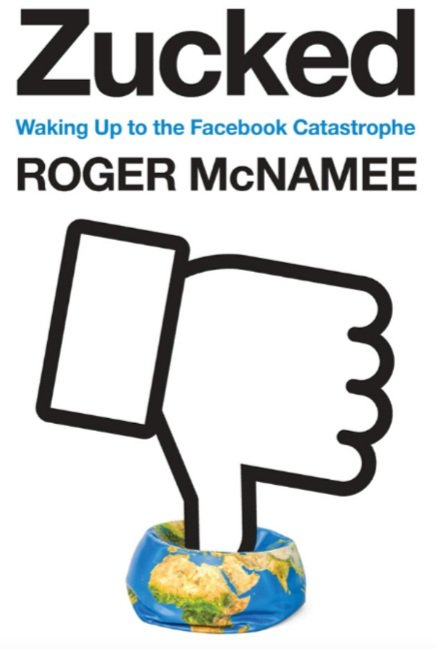Zucked: Waking Up to the Facebook Catastrophe
Review from The New York Times
The dystopia George Orwell conjured up in “1984” wasn’t a prediction. It was, instead, a reflection. Newspeak, the Ministry of Truth, the Inner Party, the Outer Party — that novel sampled and remixed a reality that Nazi and Soviet totalitarianism had already made apparent. Scary stuff, certainly, but maybe the more frightening dystopia is the one no one warned you about, the one you wake up one morning to realize you’re living inside.
Roger McNamee, an esteemed venture capitalist, would appear to agree. “A dystopian technology future overran our lives before we were ready,” he writes in “Zucked.” Think that sounds like overstatement? Let’s examine the evidence. At its peak the planet’s fourth most valuable company, and arguably its most influential, is controlled almost entirely by a young man with the charisma of a geometry T.A. The totality of this man’s professional life has been running this company, which calls itself “a platform.” Company, platform — whatever it is, it provides a curious service wherein billions of people fill it with content: baby photos, birthday wishes, concert promotions, psychotic premonitions of Jewish lizard-men. No one is paid by the company for this labor; on the contrary, users are rewarded by being tracked across the web, even when logged out, and consequently strip-mined by a complicated artificial intelligence trained to sort surveilled information into approximately 29,000 predictive data points, which are then made available to advertisers and other third parties, who now know everything that can be known about a person without trepanning her skull. Amazingly, none of this is secret, despite the company’s best efforts to keep it so. Somehow, people still use and love this platform.
Hostile foreign intelligence services also love this platform, if only because its users have proved shockingly vulnerable to social manipulation — a dark art the company itself has admitted to dabbling in. In 2014, the company set out to learn whether it could make its users sad and angry on purpose. It learned it could. When this astonishing breach of user trust became public, the company claimed it wasn’t a big deal, that many companies did similar things. It was, and they don’t.
A tech company founded on creating human connection is now ripping American society apart and compromising our civic foundation, though not because it has overtly wicked intent. As McNamee elucidates, our “democracy has been undermined because of design choices.” Choices including the platform’s pleasurable, frictionless interface, which encourages users to stay and return. It’s no stretch to posit that because human neurotransmitters respond to the platform’s iconic use of a certain shade of blue, and spark with dopamine upon receiving a “like” or “tag” notification, desperate children are now living in cages and a raving madman occupies the Oval Office. Not even Orwell, after a feast of psilocybin, could have predicted this dystopia. This one’s all ours.
For any aliens or recently arrived time travelers reading this, the company in question is Facebook, and its young leader Mark Zuckerberg, with whom McNamee has such a long and familiar relationship so as to refer to him throughout by his diminutive, Zuck. In 2006, McNamee writes, he counseled the 22-year-old C.E.O. against selling Facebook to Yahoo for a billion dollars. “I don’t want to disappoint everyone,” Zuckerberg said. McNamee urged him to look beyond that and “keep Facebook independent.” Zuck heeded McNamee’s advice, and here we are. MORE
ABOUT THE AUTHOR
Roger McNamee is an American businessman, investor, venture capitalist and musician. He is the founding partner of the venture capital firm Elevation Partners. Prior to co-founding the firm, McNamee co-founded private equity firm Silver Lake Partners and headed the T. Rowe Price Science and Technology Fund.

